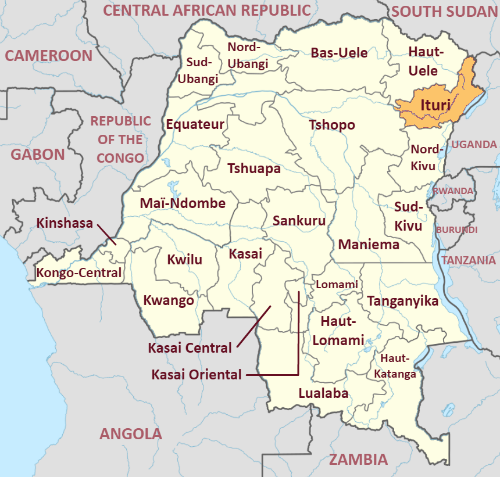The CODECO militia, one of the 120 rebel groups in the eastern Democratic Republic of the Congo (DRC), has displaced hundreds of thousands of people. In Ituri province’s Djugu territory, the community of Drodro has seen a surge in attacks by a coalition of militia groups called the Cooperative for the Development of the Congo (CODECO). About 550,000 people have been forced to flee their homes from January to March, according to UN data.
One month since rebels closed in on Drodro village, the once bustling wards of its hospital are empty, and Dr James Semire strolls the darkened corridors wondering when patients will dare to return.
Semire said members of the Hema herding community started to abandon Drodro in mid-March before a rumoured CODECO advance. The group claims to defend the interests of Lendu farmers, who have long been in conflict with Hema herders.
Most Hema locals had left by March 22, the day CODECO fighters took up positions on a hillside near Drodro in broad daylight, the doctor recalled. “Suddenly, someone came to tell me that there were gunshots outside,” said Semire, who also fled his home but still works in the hospital in case any people come in needing treatment. “There are repeated attacks,” he said. “This delays the return of people here because it creates doubts.”
Driven from the sources of their livelihood, Ituri’s displaced people have gathered in areas of perceived safety such as Rhoe, a camp of ramshackle huts near a UN peacekeeping base north of Drodro. Its population has nearly doubled to 65,000 since the beginning of 2023, according to camp representative Samuel Kpadjanga.
The road between Rhoe and the provincial capital, Bunia, about 70km (45 miles) to the southwest, is dotted with CODECO checkpoints, which squeeze the camp’s supplies. The presence of fighters in the forests and fields around the camp makes attacks on those who venture out a regular occurrence, Kpadjanga said.
One resident, who asked not to be named, said a day earlier she had been held at gunpoint by three men in a nearby field. “They argued. One said they should kill me, another said no. My life is safe, but they took everything from me, my scythe, my money,” she said back in a hut at Rhoe camp as a toddler peeked at her from the doorway.
In 2021, the government of the DRC declared a “state of siege” for both Ituri and the neighbouring province of North Kivu because of escalating violence. The country has the largest population of internally displaced people on the African continent with the UN estimating at least 5.6 million have fled their homes.
The attacks have spilled over from villages to shelters housing the internally displaced, according to the UN. The Plaine Savo camp has been repeatedly attacked by armed groups, including those affiliated with CODECO, leaving families dead and shelters burned to the ground.
The CODECO militia has been accused of committing numerous human rights violations, including massacres of civilians and rape. The group has also been involved in clashes with other militia groups in the region, leading to a cycle of violence and displacement. The situation in Ituri province has been further complicated by intercommunal tensions between the Hema and Lendu communities, who have a long history of conflict over land and resources.
The UN and humanitarian organizations have been working to provide assistance to the displaced population, but the scale of the crisis has overwhelmed the capacity of aid groups. The COVID-19 pandemic has also added to the challenges faced by those forced to flee their homes, with overcrowded camps and limited access to healthcare putting people at risk of infection.
The crisis in Ituri province is just one example of the ongoing conflicts and humanitarian emergencies that continue to affect the Democratic Republic of the Congo. Despite efforts to address the underlying causes of violence, including poverty, inequality, and competition for resources, the situation remains complex and difficult to resolve. The international community has a role to play in supporting efforts to promote peace and stability in the country, and to address the humanitarian needs of those affected by conflict and displacement.
Image Credit: NordNordWest





